Turandot (Gozzi) on:
[Wikipedia]
[Google]
[Amazon]
''Turandot'' (1762) is a '' commedia dell'arte'' play by Count Carlo Gozzi after a supposedly Persian story from the collection ''Les Mille et un jours'' (1710–1712) by
 ''Turandot'' was deliberately written in the Commedia dell'arte style by Gozzi, as part of a campaign in his literary war against the bourgeois, realistic works of Pietro Chiari and
''Turandot'' was deliberately written in the Commedia dell'arte style by Gozzi, as part of a campaign in his literary war against the bourgeois, realistic works of Pietro Chiari and
 In 1801 Friedrich Schiller translated Gozzi's Commedia dell'arte play, at the same time re-interpreting it in the Romantic style.
It was first produced in 1802 by at the 'old' Weimar Hoftheater by Johann von Goethe, who had been the theatre's director since its inception in 1791. Schiller had begun a collaborative friendship with Goethe in 1794 which lasted until Schiller's death in 1805, after which Goethe forsook ballads and turned to the completion of
In 1801 Friedrich Schiller translated Gozzi's Commedia dell'arte play, at the same time re-interpreting it in the Romantic style.
It was first produced in 1802 by at the 'old' Weimar Hoftheater by Johann von Goethe, who had been the theatre's director since its inception in 1791. Schiller had begun a collaborative friendship with Goethe in 1794 which lasted until Schiller's death in 1805, after which Goethe forsook ballads and turned to the completion of 
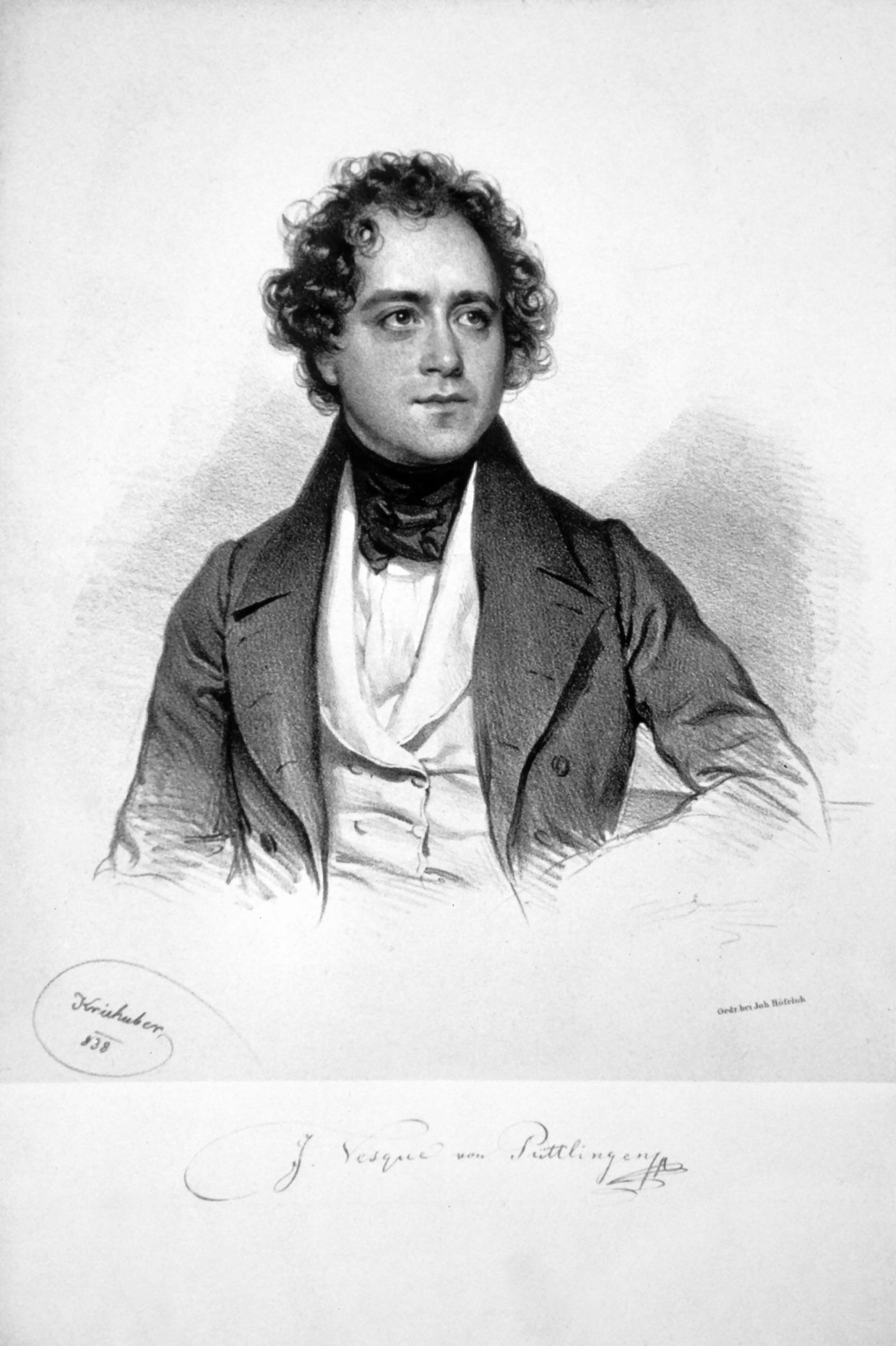 The classical commedia dell’arte characters in the play, especially Pantalone and Brighella, whose language is rather colloquial in Gozzi's version, lose their naïve nature and even speak in well-formed verses in Schiller's work; they also contribute to the more severe and moralistic atmosphere in Schiller's adaptation.
The classical commedia dell’arte characters in the play, especially Pantalone and Brighella, whose language is rather colloquial in Gozzi's version, lose their naïve nature and even speak in well-formed verses in Schiller's work; they also contribute to the more severe and moralistic atmosphere in Schiller's adaptation.
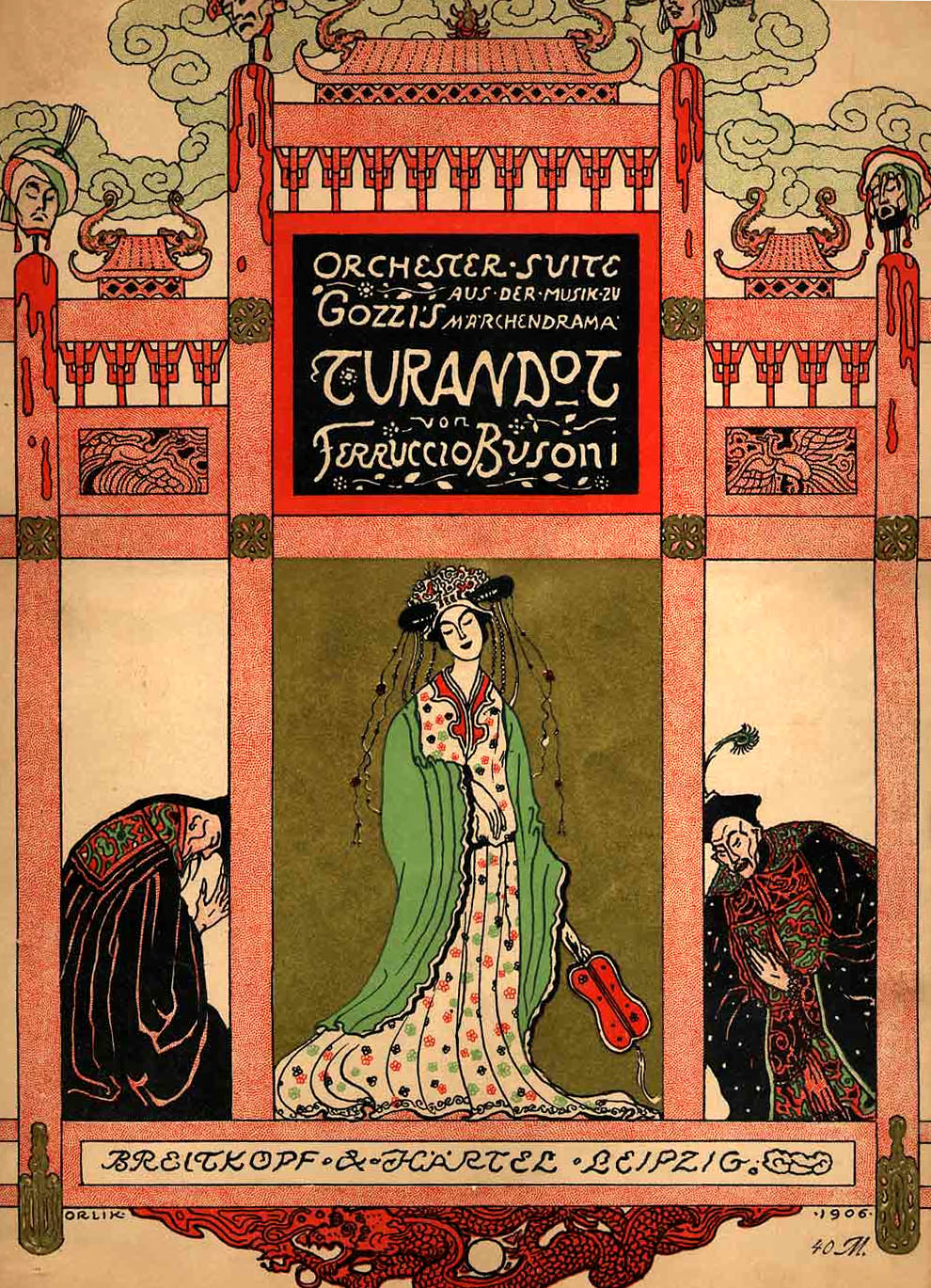 After reading Gozzi's play, Ferruccio Busoni began sketching out some incidental music to accompany it (1904-1905). He swiftly expanded the sketches into the '' Turandot Suite'', first performance 21 October 1905, published in 1906. Busoni added a further movement to the Suite in 1911 for the play's first Berlin production (see below), and substituted another in 1917 after completing his opera on the same subject.
After reading Gozzi's play, Ferruccio Busoni began sketching out some incidental music to accompany it (1904-1905). He swiftly expanded the sketches into the '' Turandot Suite'', first performance 21 October 1905, published in 1906. Busoni added a further movement to the Suite in 1911 for the play's first Berlin production (see below), and substituted another in 1917 after completing his opera on the same subject.
 After completing his ''Turandot Suite'' Busoni approached
After completing his ''Turandot Suite'' Busoni approached
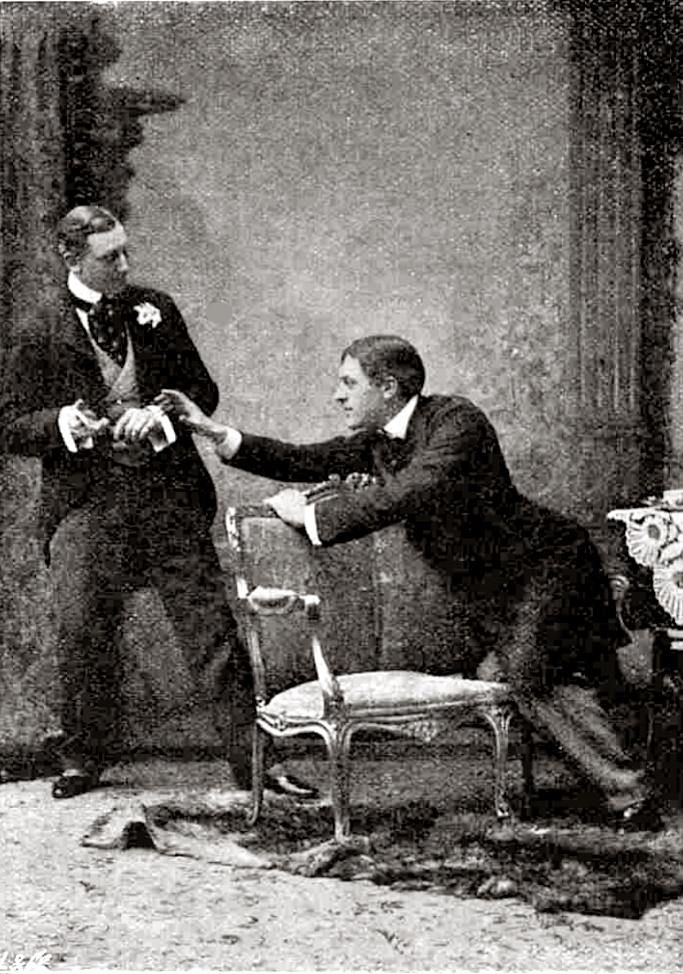 Reinhardt's Berlin production was brought to London in 1913 by the actor-manager and impresario Sir George Alexander. Vollmoeller's 1911 translation of Gozzi was re-translated into English by Jethro Bithell (1878-1962). A pupil of Busoni's, Johan Wijsman, made an unauthorised reduced orchestration of Busoni's score (and added music by other composers).
Cast of the play as produced at the
Reinhardt's Berlin production was brought to London in 1913 by the actor-manager and impresario Sir George Alexander. Vollmoeller's 1911 translation of Gozzi was re-translated into English by Jethro Bithell (1878-1962). A pupil of Busoni's, Johan Wijsman, made an unauthorised reduced orchestration of Busoni's score (and added music by other composers).
Cast of the play as produced at the
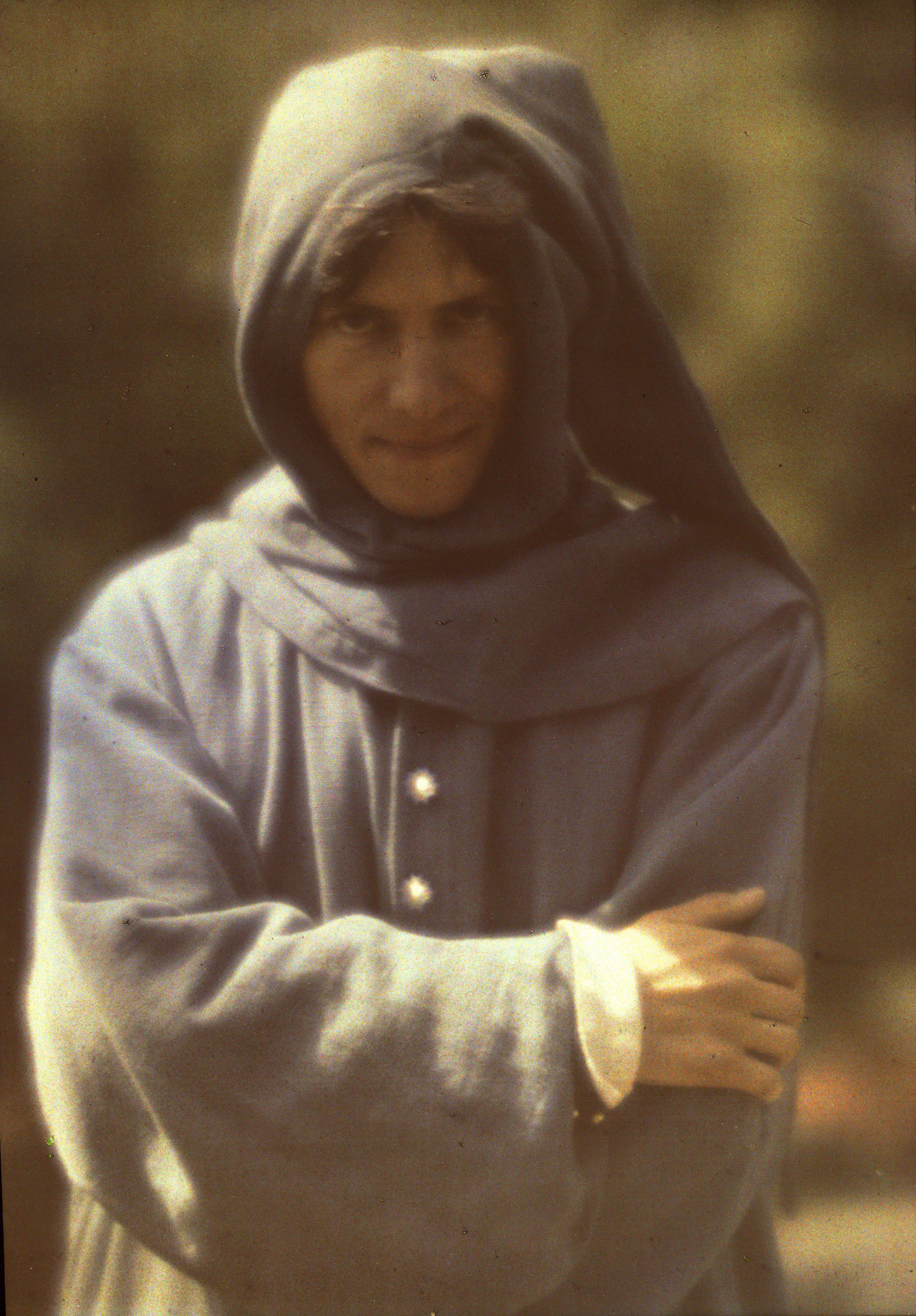 Vollmoeller's play was produced in the USA by the Shuberts at the Hyperion Theatre,
Vollmoeller's play was produced in the USA by the Shuberts at the Hyperion Theatre,
/ref>
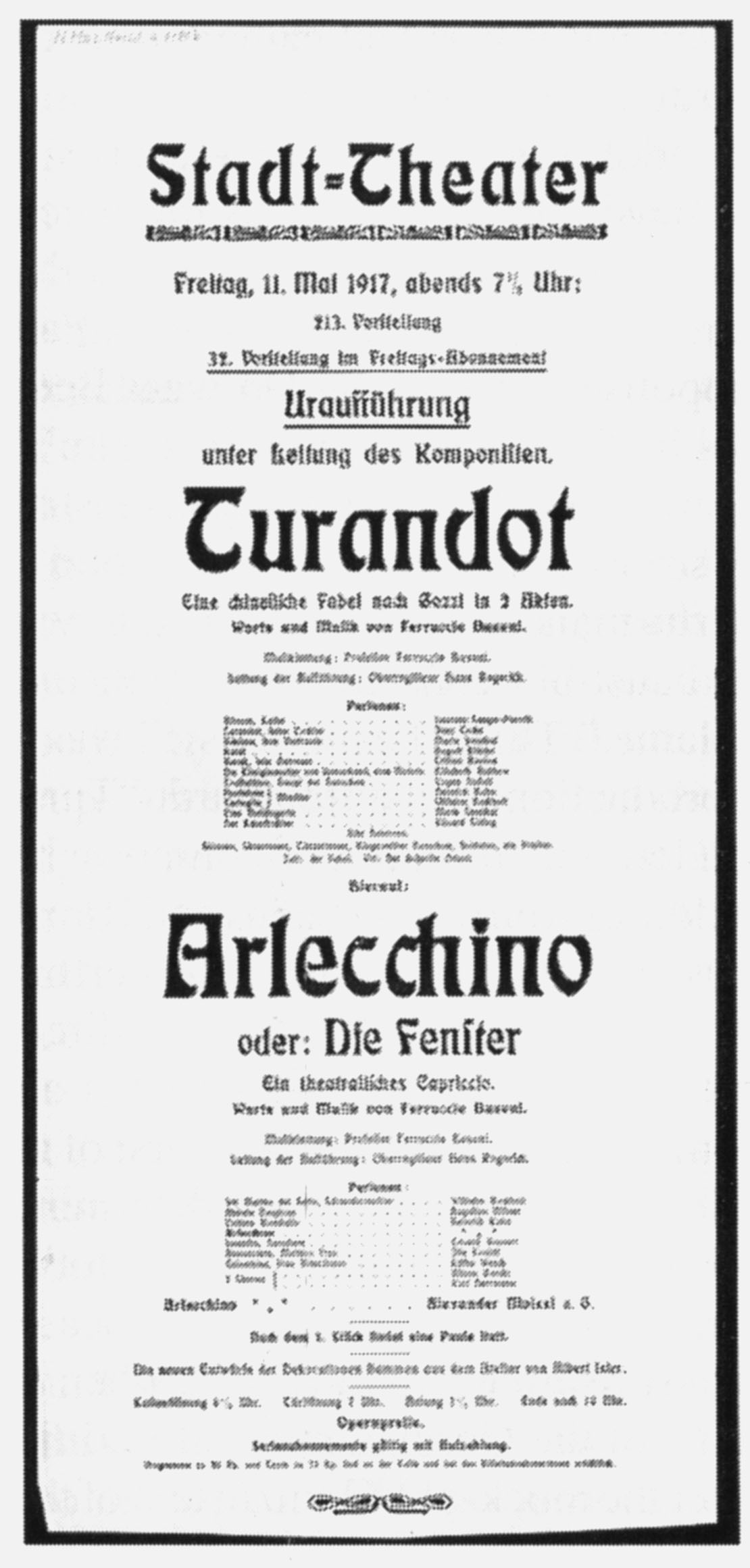
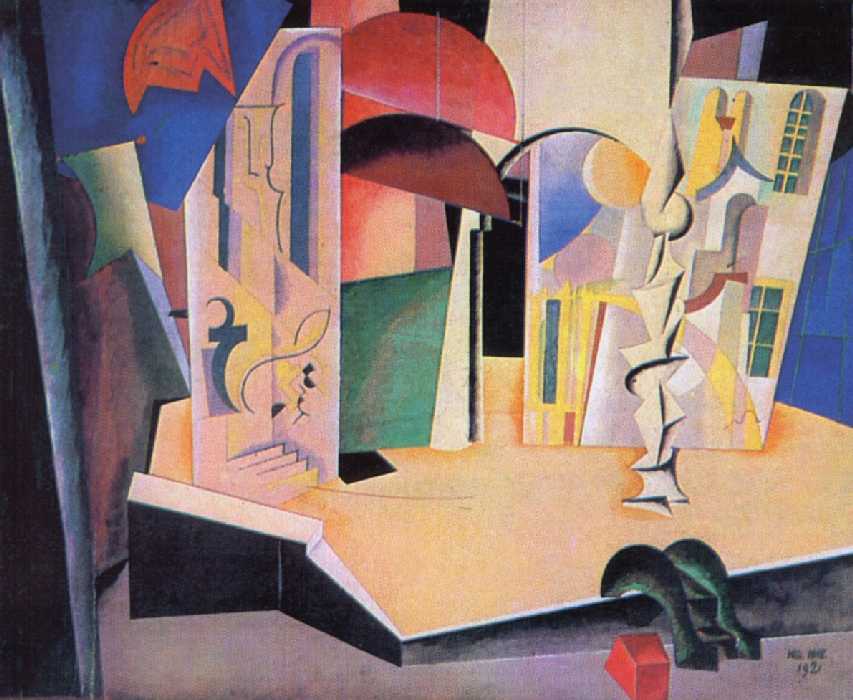
A Meeting Point or a Turning Point: On Vakhtangov’s Theatrical Activities and Thought
/ref>
Volume 1Volume 2
* *
The many faces of Turandot
by Peter Bassett. Retrieved 23 September 2015.
Princess Turandot Fountain
outside the Vakhtangov Theatre in Arbat Street, Moscow *
Full score of Stenhammar's incidental music
at IMSLP * Complete film o
''Prinzessin Turandot''
on YouTube {{Turandot 1762 plays Plays adapted into operas Italian plays adapted into films Plays by Carlo Gozzi
François Pétis de la Croix
François Pétis de la Croix (1653–1713) was a French orientalist.
He was born in Paris, the son of the Arabic interpreter of the French court and author, also named François Pétis de la Croix (1622–1695) and inherited this office at ...
(not to be confused with '' One Thousand and One Nights''). Gozzi's ''Turandot'' was first performed at the Teatro San Samuele, Venice
Venice ( ; it, Venezia ; vec, Venesia or ) is a city in northeastern Italy and the capital of the Veneto region. It is built on a group of 118 small islands that are separated by canals and linked by over 400 bridges. The isla ...
, on 22 January 1762.
Gozzi's play has given rise to a number of subsequent artistic endeavours, including combinations of: versions/translations by Schiller, Karl Vollmoeller Karl may refer to:
People
* Karl (given name), including a list of people and characters with the name
* Karl der Große, commonly known in English as Charlemagne
* Karl Marx, German philosopher and political writer
* Karl of Austria, last Austria ...
and Brecht
Eugen Berthold Friedrich Brecht (10 February 1898 – 14 August 1956), known professionally as Bertolt Brecht, was a German theatre practitioner, playwright, and poet. Coming of age during the Weimar Republic, he had his first successes as a p ...
; theatrical productions by Goethe
Johann Wolfgang von Goethe (28 August 1749 – 22 March 1832) was a German poet, playwright, novelist, scientist, statesman, theatre director, and critic. His works include plays, poetry, literature, and aesthetic criticism, as well as tr ...
, Max Reinhardt
Max Reinhardt (; born Maximilian Goldmann; 9 September 1873 – 30 October 1943) was an Austrian-born theatre and film director, intendant, and theatrical producer. With his innovative stage productions, he is regarded as one of the most pro ...
and Yevgeny Vakhtangov
Yevgeny Bagrationovich Vakhtangov (also spelled Evgeny or Eugene; russian: Евге́ний Багратио́нович Вахта́нгов; 13 February 1883 – 29 May 1922) was a Russian-Armenian actor and theatre director who founded the ...
; incidental music by Weber, Busoni
Ferruccio Busoni (1 April 1866 – 27 July 1924) was an Italian composer, pianist, conductor, editor, writer, and teacher. His international career and reputation led him to work closely with many of the leading musicians, artists and literary f ...
and Wilhelm Stenhammar; and operas by Busoni, Puccini
Giacomo Puccini ( Lucca, 22 December 1858Bruxelles, 29 November 1924) was an Italian composer known primarily for his operas. Regarded as the greatest and most successful proponent of Italian opera after Verdi, he was descended from a long ...
and Havergal Brian
Havergal Brian (born William Brian; 29 January 187628 November 1972) was an English composer. He is best known for having composed 32 symphonies (an unusually high total for a 20th-century composer), most of them late in his life. His best-known ...
.
Original play and performance
 ''Turandot'' was deliberately written in the Commedia dell'arte style by Gozzi, as part of a campaign in his literary war against the bourgeois, realistic works of Pietro Chiari and
''Turandot'' was deliberately written in the Commedia dell'arte style by Gozzi, as part of a campaign in his literary war against the bourgeois, realistic works of Pietro Chiari and Carlo Goldoni Carlo is a given name. It is an Italian form of Charles. It can refer to:
* Carlo (name)
* Monte Carlo
* Carlingford, New South Wales, a suburb in north-west Sydney, New South Wales, Australia
*A satirical song written by Dafydd Iwan about Prince ...
. Gozzi was intimate with the out-of work theatre troupe of Antonio Sacchi, an inveterate ''commedia'' Truffaldino. It was first performed by Sacchi's troupe at the Teatro San Samuele in Venice on 22 January 1762, and received seven subsequent performances. The choice of theatre itself was a pointed attack on Goldoni, since he had been the theatre's director between 1737–1741. In the end, Gozzi won his literary war: according to his ''Memoirs'', "Chiari stopped writing when he saw that his dramas ceased to take. Goldoni went to Paris, to seek his fortune there, whereof we shall be duly informed in his Memoirs."
Friedrich Werthes
The poet and playwright Friedrich Werthes ( Buttenhausen, 12 October 1748– Stuttgart, 5 December 1817) made a translation of Gozzi's complete plays, employing prose rather than verse for the characters' lines. Schiller's ''Turandot'' (see below) is partly based on Werthes' version.Friedrich Schiller
 In 1801 Friedrich Schiller translated Gozzi's Commedia dell'arte play, at the same time re-interpreting it in the Romantic style.
It was first produced in 1802 by at the 'old' Weimar Hoftheater by Johann von Goethe, who had been the theatre's director since its inception in 1791. Schiller had begun a collaborative friendship with Goethe in 1794 which lasted until Schiller's death in 1805, after which Goethe forsook ballads and turned to the completion of
In 1801 Friedrich Schiller translated Gozzi's Commedia dell'arte play, at the same time re-interpreting it in the Romantic style.
It was first produced in 1802 by at the 'old' Weimar Hoftheater by Johann von Goethe, who had been the theatre's director since its inception in 1791. Schiller had begun a collaborative friendship with Goethe in 1794 which lasted until Schiller's death in 1805, after which Goethe forsook ballads and turned to the completion of Part one
Part, parts or PART may refer to:
People
*Armi Pärt (born 1991), Estonian handballer
* Arvo Pärt (born 1935), Estonian classical composer
*Brian Part (born 1962), American child actor
*Dealtry Charles Part (1882–1961), sheriff (1926–1927) a ...
of ''Faust
Faust is the protagonist of a classic German legend based on the historical Johann Georg Faust ( 1480–1540).
The erudite Faust is highly successful yet dissatisfied with his life, which leads him to make a pact with the Devil at a crossroa ...
''.
;Comparison of Gozzi's and Schiller's versions
Gozzi's play has a "light, sarcastic tone" whereas Schiller transforms it into a symbolic epic with an idealised moral attitude. Gozzi, although he also uses both elements of drama and comedy, puts them side by side as independent parts; Schiller combines them and makes them the result of each other. This interaction of dramatic and comical, their interdependence and the fact of their being equally matched, embodies the Romantic principle of universalism.
Gozzi's main character, the princess Turandot, seems to act out of a mood and cruelty whereas Schiller's Turandot is a person who resolutely follows her moral and ethical attitude. Also prince Calàf, who is a kind of lost soul and philanderer in Gozzi's version, becomes a kind lover who surrenders to his deep and true love for Turandot.

 The classical commedia dell’arte characters in the play, especially Pantalone and Brighella, whose language is rather colloquial in Gozzi's version, lose their naïve nature and even speak in well-formed verses in Schiller's work; they also contribute to the more severe and moralistic atmosphere in Schiller's adaptation.
The classical commedia dell’arte characters in the play, especially Pantalone and Brighella, whose language is rather colloquial in Gozzi's version, lose their naïve nature and even speak in well-formed verses in Schiller's work; they also contribute to the more severe and moralistic atmosphere in Schiller's adaptation.
Carl Maria von Weber
Carl Maria von Weber
Carl Maria Friedrich Ernst von Weber (18 or 19 November 17865 June 1826) was a German composer, conductor, virtuoso pianist, guitarist, and critic who was one of the first significant composers of the Romantic era. Best known for his operas, ...
based his 1805 ''Chinese Ouverture'' on a Chinese theme found in Jean-Jacques Rousseau
Jean-Jacques Rousseau (, ; 28 June 1712 – 2 July 1778) was a Genevan philosopher, writer, and composer. His political philosophy influenced the progress of the Age of Enlightenment throughout Europe, as well as aspects of the French Revolu ...
's ''Dictionnaire de musique''.
Weber's friend, the composer Franz Danzi
Franz Ignaz Danzi (15 June 1763 – 13 April 1826) was a German cellist, composer and conductor, the son of the Italian cellist Innocenz Danzi (1730–1798) and brother of the noted singer Franzeska Danzi. Danzi lived at a significant time in t ...
, was employed as Kapellmeister in the Stuttgart court of King Frederick I of Württemberg, and when Weber obtained a non-musical position as the private secretary of the King's brother, Duke Ludwig, Danzi encouraged Weber to write some music for a performance of Schiller's play at the court theatre. The result was his 1809 ''Incidental music for Turandot'', J.37 which incorporated the ''Chinese Ouverture''.
Franz Danzi
Franz Danzi
Franz Ignaz Danzi (15 June 1763 – 13 April 1826) was a German cellist, composer and conductor, the son of the Italian cellist Innocenz Danzi (1730–1798) and brother of the noted singer Franzeska Danzi. Danzi lived at a significant time in t ...
later wrote his own singspiel ''Turandot'' based on Schiller in 1816, which was performed in Karlsruhe
Karlsruhe ( , , ; South Franconian: ''Kallsruh'') is the third-largest city of the German state (''Land'') of Baden-Württemberg after its capital of Stuttgart and Mannheim, and the 22nd-largest city in the nation, with 308,436 inhabitants. ...
in 1817.
'J. Hoven'
The lawyer and composerJohann Vesque von Püttlingen
Johann Vesque von Püttlingen (pseudonym Johann Hoven) (23 July 1803 – 29 October 1883), born J. Vesque de Puttelange, was an Austrian lawyer, diplomat, author, composer and singer. His full name and title in German was Johann Vesque, Freiherr ...
was a friend of Franz Schubert
Franz Peter Schubert (; 31 January 179719 November 1828) was an Austrian composer of the late Classical and early Romantic eras. Despite his short lifetime, Schubert left behind a vast ''oeuvre'', including more than 600 secular vocal wo ...
and Felix Mendelssohn. Born in the Lubomirski Palace, near Lublin, West Galicia
New Galicia or West Galicia ( pl, Nowa Galicja or ''Galicja Zachodnia'', german: Neugalizien or ''Westgalizien'') was an administrative region of the Habsburg monarchy, constituted from the territory annexed in the course of the Third Partition ...
, he grew up in Vienna and trained as a lawyer, rising to section director in the Austrian Foreign Ministry under Metternich
Klemens Wenzel Nepomuk Lothar, Prince of Metternich-Winneburg zu Beilstein ; german: Klemens Wenzel Nepomuk Lothar Fürst von Metternich-Winneburg zu Beilstein (15 May 1773 – 11 June 1859), known as Klemens von Metternich or Prince Metternic ...
. Under the pseudonym 'J. Hoven' (after Ludwig van Beethoven
Ludwig van Beethoven (baptised 17 December 177026 March 1827) was a German composer and pianist. Beethoven remains one of the most admired composers in the history of Western music; his works rank amongst the most performed of the classic ...
) he composed over 300 songs and 8 operas, among which was ''Turandot, Princess of Shiraz'', libretto after Schiller, first performed on 3 October 1838.
Andrea Maffei
Schiller's play was re-translated into Italian by his friendAndrea Maffei
Andrea Maffei (1798 – 1885) was an Italian poet, translator and librettist. He was born in Molina di Ledro, Trentino. A follower of Vincenzo Monti, he formed part of the 19th-century Italian classicist literary culture. Gaining laurea in juris ...
in 1863.
Antonio Bazzini
Antonio Bazzini's opera ''Turanda'', with a libretto byAntonio Gazzoletti
Antonio is a masculine given name of Etruscan origin deriving from the root name Antonius. It is a common name among Romance language-speaking populations as well as the Balkans and Lusophone Africa. It has been among the top 400 most popular mal ...
, was first performed at La Scala, Milan, 13 January 1867.
Bazzini later taught composition to Giacomo Puccini
Giacomo Puccini ( Lucca, 22 December 1858Bruxelles, 29 November 1924) was an Italian composer known primarily for his operas. Regarded as the greatest and most successful proponent of Italian opera after Verdi, he was descended from a long ...
and Pietro Mascagni
Pietro Mascagni (7 December 1863 – 2 August 1945) was an Italian composer primarily known for his operas. His 1890 masterpiece '' Cavalleria rusticana'' caused one of the greatest sensations in opera history and single-handedly ushered in the ...
at the Milan Conservatory
The Milan Conservatory (''Conservatorio di Milano'') is a college of music in Milan, Italy.
History
The conservatory was established by a royal decree of 1807 in Milan, capital of the Napoleonic Kingdom of Italy. It opened the following year ...
.
Sabilla Novello
A free English translation from Schiller by Sabilla Novello was published in 1872.Busoni ''Turandot Suite''
 After reading Gozzi's play, Ferruccio Busoni began sketching out some incidental music to accompany it (1904-1905). He swiftly expanded the sketches into the '' Turandot Suite'', first performance 21 October 1905, published in 1906. Busoni added a further movement to the Suite in 1911 for the play's first Berlin production (see below), and substituted another in 1917 after completing his opera on the same subject.
After reading Gozzi's play, Ferruccio Busoni began sketching out some incidental music to accompany it (1904-1905). He swiftly expanded the sketches into the '' Turandot Suite'', first performance 21 October 1905, published in 1906. Busoni added a further movement to the Suite in 1911 for the play's first Berlin production (see below), and substituted another in 1917 after completing his opera on the same subject.
Karl Vollmoeller/Max Reinhardt production - Berlin
 After completing his ''Turandot Suite'' Busoni approached
After completing his ''Turandot Suite'' Busoni approached Max Reinhardt
Max Reinhardt (; born Maximilian Goldmann; 9 September 1873 – 30 October 1943) was an Austrian-born theatre and film director, intendant, and theatrical producer. With his innovative stage productions, he is regarded as one of the most pro ...
in late 1906 about staging a production of Gozzi's play with Busoni's music. His idea eventually came to fruition four years later at the Deutsches Theater, Berlin in 1911, in a production by Reinhardt. Karl Vollmoeller Karl may refer to:
People
* Karl (given name), including a list of people and characters with the name
* Karl der Große, commonly known in English as Charlemagne
* Karl Marx, German philosopher and political writer
* Karl of Austria, last Austria ...
provided a German translation of Gozzi's play, dedicated to Busoni; the sets were by Ernst Stern
Ernst Stern (1 April 1876 – 28 August 1954) was a Romanian-German scenic designer who, through his collaborations with most of the prominent German directors of the early 20th century, helped define the aesthetic of expressionism in both the ...
. The incidental music (probably the published ''Turandot Suite'' with the additional number) was played by a full symphony orchestra conducted by Oskar Fried
Oskar Fried (1 August 1871 – 5 July 1941) was a German conductor and composer. He was known as a great admirer of Gustav Mahler, whose works he performed many times throughout his life. Fried was also the first conductor to record a Mahler symp ...
.
Max Reinhardt production - London
 Reinhardt's Berlin production was brought to London in 1913 by the actor-manager and impresario Sir George Alexander. Vollmoeller's 1911 translation of Gozzi was re-translated into English by Jethro Bithell (1878-1962). A pupil of Busoni's, Johan Wijsman, made an unauthorised reduced orchestration of Busoni's score (and added music by other composers).
Cast of the play as produced at the
Reinhardt's Berlin production was brought to London in 1913 by the actor-manager and impresario Sir George Alexander. Vollmoeller's 1911 translation of Gozzi was re-translated into English by Jethro Bithell (1878-1962). A pupil of Busoni's, Johan Wijsman, made an unauthorised reduced orchestration of Busoni's score (and added music by other composers).
Cast of the play as produced at the St. James's Theatre
The St James's Theatre was in King Street, St James's, London. It opened in 1835 and was demolished in 1957. The theatre was conceived by and built for a popular singer, John Braham; it lost money and after three seasons he retired. A suc ...
, London, on 18 January 1913, under the management of Sir George Alexander.
*Turandot: Evelyn D'Alroy
*Altoum: J. H. Barnes
*Adelma: Hilda Moore
Hilda Mary Moore (born 1886 in London – 18 May 1929 in New York City) was a British stage and film actress.
Hilda Moore served in France in WW1 with the FANY British Convoy (First Aid Nursing Yeomanry). The FANY were the first women to driv ...
*Zelima: Maire O'Neill
Maire O'Neill (born Mary Agnes Allgood; 11 January 1886 – 2 November 1952) was an Irish actress of stage and film. She holds a place in theatre history as the first actress to interpret the lead character of Pegeen Mike Flaherty in John Mill ...
*Skirina: Margaret Yarde
*Barak: Alfred Harris
*Calaf: Godfrey Tearle
Sir Godfrey Seymour Tearle (12 October 1884 – 9 June 1953) was a British actor who portrayed the quintessential British gentleman on stage and in both British and US films.
Biography
Born in New York City and brought up in Britain, he was t ...
*Ishmael: James Berry
*Pantalone: Edward Sass
*Tartaglia: E. Vivian Reynolds
*Brigella: Fred Lewis
*Truffaldino: Norman Forbes
*Prince of Samarkand: Austin Fehrman
Vollmoeller/J.C. Huffmann
 Vollmoeller's play was produced in the USA by the Shuberts at the Hyperion Theatre,
Vollmoeller's play was produced in the USA by the Shuberts at the Hyperion Theatre, New Haven, Connecticut
New Haven is a city in the U.S. state of Connecticut. It is located on New Haven Harbor on the northern shore of Long Island Sound in New Haven County, Connecticut and is part of the New York City metropolitan area. With a population of 134 ...
, on 31 December 1912.The previous show at the Hyperion was a film called '' The Miracle: a legend of medieval times''. This German film (original title: ''Das Mirakel'') was an unauthorised version of another work by Karl Vollmoeller Karl may refer to:
People
* Karl (given name), including a list of people and characters with the name
* Karl der Große, commonly known in English as Charlemagne
* Karl Marx, German philosopher and political writer
* Karl of Austria, last Austria ...
, '' The Miracle (play)'' which had played at Olympia, London
Olympia London, sometimes referred to as the Olympia Exhibition Centre, is an exhibition centre, event space and conference centre in West Kensington, in the London Borough of Hammersmith and Fulham, London, England. A range of internati ...
in a spectacular production by Max Reinhardt
Max Reinhardt (; born Maximilian Goldmann; 9 September 1873 – 30 October 1943) was an Austrian-born theatre and film director, intendant, and theatrical producer. With his innovative stage productions, he is regarded as one of the most pro ...
. The 'genuine' film of the production, ''The Miracle (1912 film)
''The Miracle'' (1912) (Germany: ''Das Mirakel'', France: ''Le Miracle''), is a British* "The International Federation of Film Archives (FIAF) defines the country of origin as the country of the principal offices of the production company or in ...
'' by Joseph Menchen was first shown in the US on 17 February 1913 at the Park Theatre, New York. The producer was J. C. Huffmann, whose production designs were influenced by Reinhardt's. The cast included Emily Stevens, Josephine Victor, Alice Martin, Margaret Greville, Frank Peters, Pedro de Cordova (José Luis Medrano), Edward Emery (see Florence Farr
Florence Beatrice Emery (''née'' Farr; 7 July 1860 – 29 April 1917) was a British West End leading actress, composer and director. She was also a women's rights activist, journalist, educator, singer, novelist, and leader of the occult ...
and John Emery), Lennox Pawle, Daniel Gilfeather, Anthony Andre and 20 others. Incidental music by Oscar Racin. According to a New York Times report, the Vollmoeller script arrived without scenes or acts being designated, and was tidied up by Huffmann; however, the play was not a success.''New York Times'' January 11, 1914/ref>
Percy MacKaye/J. C. Huffmann
In the wake of the failure of Vollmoeller's play at the Hyperion Theatre,Lee Shubert
Lee Shubert (born Levi Schubart; March 25, 1871– December 25, 1953) was a Lithuanian-born American theatre owner/operator and producer and the eldest of seven siblings of the theatrical Shubert family.
Biography
Born to a Jewish family, the so ...
asked Percy MacKaye
Percy MacKaye (1875–1956) was an American dramatist and poet.
Biography
MacKaye was born in New York City into a theatrical family. His father, Steele MacKaye, was a popular actor, playwright, and producer, while his mother, Mary, wrote a dra ...
to revise ''Turandot'' for American audiences. In the end MacKaye wrote a new work, ''A Thousand Years Ago'', which was presented a year later at the
Shubert Theatre on 1 December 1913. The production re-used Huffmann's earlier set designs and incorporated the ideas of Reinhardt and Edward Gordon Craig
Edward Henry Gordon CraigSome sources give "Henry Edward Gordon Craig". (born Edward Godwin; 16 January 1872 – 29 July 1966), sometimes known as Gordon Craig, was an English modernist theatre practitioner; he worked as an actor, director a ...
. It transferred to the Lyric Theatre (New York) in January 1914.

Busoni ''Turandot'' opera
Busoni's opera ''Turandot
''Turandot'' (; see below) is an opera in three acts by Giacomo Puccini, posthumously completed by Franco Alfano in 1926, and set to a libretto in Italian by Giuseppe Adami and Renato Simoni. ''Turandot'' best-known aria is " Nessun dorma", ...
'' was based on the music of his earlier orchestral ''Turandot Suite''; he wrote his own libretto, also possibly using the translation which Karl Vollmoeller had made for the 1911 Reinhardt production. The opera was first performed in the Stadttheater, Zürich (now the Zürich Opera House
The Zürich Opera House (german: Opernhaus Zürich, links=no) is an opera house in the Swiss city of Zürich. Located at the Sechseläutenplatz, it has been the home of the Zürich Opera since 1891, and also houses the Bernhard-Theater Zürich. ...
) 11 May 1917.
Wilhelm Stenhammar
Wilhelm Stenhammar wrote his ''Musik till Carlo Gozzis skådepel "Turandot"'' (''Music for Gozzi's spectacle "Turandot"''), Op. 42 (1920) for flute, clarinet, bassoon and percussion (triangle, cymbals, bass drum and tamtam), as incidental music for a (Swedish?) production of the Gozzi play. ''See also'' § External links ''below''.
Yevgeny Vakhtangov - Moscow
Yevgeny Vakhtangov
Yevgeny Bagrationovich Vakhtangov (also spelled Evgeny or Eugene; russian: Евге́ний Багратио́нович Вахта́нгов; 13 February 1883 – 29 May 1922) was a Russian-Armenian actor and theatre director who founded the ...
staged a highly acclaimed avant-garde performance of Gozzi's play in Moscow in 1921.
Provincetown Playhouse production
Isaac Don Levine
Isaac Don Levine (January 19, 1892 – February 15, 1981) was a 20th-century Russian-born American journalist and anticommunist writer, who is known as a specialist on the Soviet Union.
He worked with Soviet ex-spy Walter Krivitsky in a 1939 exp ...
and Henry Alsberg
Henry Garfield Alsberg (September 21, 1881November 1, 1970) was an American journalist and writer who served as the founding director of the Federal Writers' Project.
A lawyer by training, he was a foreign correspondent during the Russian Rev ...
translated and adapted ''Turandot'' to open the 1926 season at the Provincetown Playhouse
The Provincetown Playhouse is a historic theatre at 133 MacDougal Street between West 3rd and West 4th Streets in the Greenwich Village neighborhood of Manhattan, New York City. It is named for the Provincetown Players, who converted the former ...
in New York.
Puccini ''Turandot'' opera
Giacomo Puccini
Giacomo Puccini ( Lucca, 22 December 1858Bruxelles, 29 November 1924) was an Italian composer known primarily for his operas. Regarded as the greatest and most successful proponent of Italian opera after Verdi, he was descended from a long ...
said in a letter that "...''Turandot'' is the most normal and human play in all Gozzi." The libretto for his (unfinished) opera ''Turandot
''Turandot'' (; see below) is an opera in three acts by Giacomo Puccini, posthumously completed by Franco Alfano in 1926, and set to a libretto in Italian by Giuseppe Adami and Renato Simoni. ''Turandot'' best-known aria is " Nessun dorma", ...
'' (1920-1924) is by Adami and Simoni. Apart from Gozzi's original they used Andrea Maffei
Andrea Maffei (1798 – 1885) was an Italian poet, translator and librettist. He was born in Molina di Ledro, Trentino. A follower of Vincenzo Monti, he formed part of the 19th-century Italian classicist literary culture. Gaining laurea in juris ...
's Italian translation of Schiller's German version. They also made reference to the libretto by Gazzoletti for Antonio Bazzini's ''Turanda''. Although Puccini had heard reports about Busoni's opera, he didn't see it himself.
Princess Turandot (1934 film)
''Prinzessin Turandot
''Princess Turandot'' (German: ''Prinzessin Turandot'') is a 1934 German comedy film directed by Gerhard Lamprecht and starring Käthe von Nagy and Willy Fritsch. A separate French-language version '' Turandot, Princess of China'' was also releas ...
'' is a German black-and-white sound film made in 1934. It was directed by Gerhard Lamprecht
Gerhard Lamprecht (6 October 1897 – 4 May 1974) was a German film director, screenwriter and film historian. He directed 63 films between 1920 and 1958. He also wrote for 26 films between 1918 and 1958.
Life and career
Lamprecht was fasci ...
with a script by Thea von Harbou
Thea Gabriele von Harbou (27 December 1888 – 1 July 1954) was a German screenwriter, novelist, film director, and actress. She is remembered as the screenwriter of the science fiction film classic ''Metropolis'' (1927) and for the 19 ...
, and starred Käthe von Nagy
Ekaterina Nagy von Cziser, better known by her stage name Käthe von Nagy (4 April 1904 – 20 December 1973), was a Hungarian actress, model, dancer, and singer who worked in the German and French cinema.
Early life and education
Käthe von Nag ...
as Turandot and Willy Fritsch
Willy Fritsch (27 January 1901 – 13 July 1973) was a German theater and film actor, a popular leading man and character actor from the silent-film era to the early 1960s.
Biography Early life
He was born Wilhelm Egon Fritz Fritsch, the only s ...
as Kalaf, the Birdseller. The film includes the song ''Turandot, bezaubernde Turandot'' by Franz Doelle and Bruno Balz
Bruno Balz (6 October 1902, in Berlin – 14 March 1988, in Bad Wiessee) was a German songwriter and schlager writer.
From the time he wrote the music for the first German sound film until his retirement in the 1960s, Balz was responsible for th ...
(recorded by Herbert Ernst Groh Herbert Ernst Groh (27 May 190528 July 1982) was a Swiss tenor.
Groh was born in Lucerne and subsequently studied in Zurich and Milan. One of his teachers was Carl Beines, who also taught Richard Tauber.
He began his operatic singing career in D ...
in 1935).
Havergal Brian
Havergal Brian
Havergal Brian (born William Brian; 29 January 187628 November 1972) was an English composer. He is best known for having composed 32 symphonies (an unusually high total for a 20th-century composer), most of them late in his life. His best-known ...
based the libretto of his opera ''Turandot'' (1949-1951) on Schiller's play. Like Busoni, Brian also wrote an associated orchestral ''Turandot Suite''. Brian composed his ''Turandot'' between his 8th and 9th Symphonies. In a letter, he wrote: "Turandot. I have not seen any music of the work by Busoni or Puccini.... My reason for tackling 'Turandot' was that I read a German translation and enjoyed it so much that I started work on it as an Opera."
Bertolt Brecht
Bertolt Brecht also made his own adaptation in of Gozzi's play, ''Turandot
''Turandot'' (; see below) is an opera in three acts by Giacomo Puccini, posthumously completed by Franco Alfano in 1926, and set to a libretto in Italian by Giuseppe Adami and Renato Simoni. ''Turandot'' best-known aria is " Nessun dorma", ...
, or the Whitewashers' Congress'' (1953–1954). Brecht's library contained a 1925 edition of Vollmoeller's translation. Brecht's epic comedy was first performed (posthumously) in Zurich (the same city as the premiere of Busoni's opera), in the Schauspielhaus on 5 February 1969.
Contemporary Chinese theatre
''Turandot'' has been recently rewritten and interpreted in different forms of Chinese ''xìqǔ'' (literally, 'theater of song'), often referred to as Chinese opera./ref>
See also
* Crystal Turandot Award, a Russian theatre award * '' The Curse of Turandot'', 2021 Chinese film, loosely based on Gozzi's play * Princess Turandot (disambiguation)References
Notes Citations Sources * * * * * * * * *Volume 1
* *
External links
The many faces of Turandot
by Peter Bassett. Retrieved 23 September 2015.
Princess Turandot Fountain
outside the Vakhtangov Theatre in Arbat Street, Moscow *
Full score of Stenhammar's incidental music
at IMSLP * Complete film o
''Prinzessin Turandot''
on YouTube {{Turandot 1762 plays Plays adapted into operas Italian plays adapted into films Plays by Carlo Gozzi